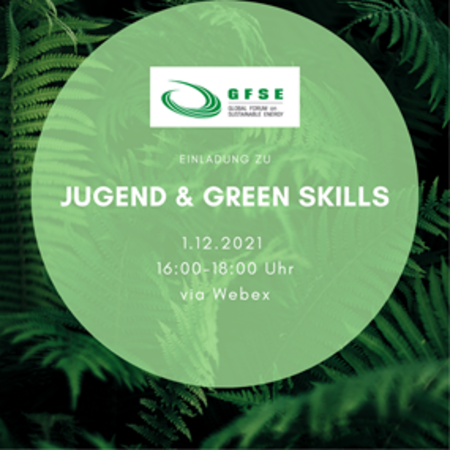GFSE Workshop "Jugend und Green Skills" 1st December 2021 - in German
The young generation has great potential to contribute to the energy transition in a variety of ways, for example by participating in decision-making processes at local and international level and as a skilled workforce supporting the development of value chains in renewable energy, energy efficiency and clean mobility. There are 1.2 billion people between the ages of 15 and 24 in the world, who want a better world. These young people are passionate about a sustainable world and have access to information and platforms that no generation has had before.
Youth are an important source of talent for achieving renewable energy and energy efficiency goals. At the same time, youth are increasingly engaged in climate change and energy transition issues. Youth have a key role to play in the pursuit of a sustainable energy system for all.
The objective of this workshop is to discuss possibilities and identify measures for the active participation of Youth in the energy transition in developing countries. The Workshop will be held in German.
Key questions
- How can the engagement of young people in the energy policy debate in developing countries be supported? How can we awaken their interest on the subject?
- How can we involve the youth in just transition strategies towards a clean energy system?
- How can we create more effective programmes to deliver green skills for young people in developing countries?
- What measures can help create better training opportunities and more jobs in the renewable energy and energy efficiency sectors?
- How can cooperation between educational institutions and companies help create demand-oriented professional training in the field of renewable energy and energy efficiency that meets the needs of companies? How to foster this cooperation?
- How to make education and training in renewable energy more inclusive and accessible to marginalized young people?
- What transformative approaches are needed to address gender gaps and empower young women in the energy transition, including by ensuring equal participation of women and men in the labour market and in decision-making processes?
- How can we create positive role models for young women?
- What can companies do to make careers in the clean energy sector more attractive to young women?
- How to foster peer-to-peer learning and exchange of experience and best-practice at the international level between young people working in the renewable energy sector?
- How can development cooperation contribute to strengthening the role of the youth in the implementation of the energy transition in developing countries?
- How to enable young people in industrialised countries exchanges with young people in developing countries and participation in development cooperation projects targeting the youth?
